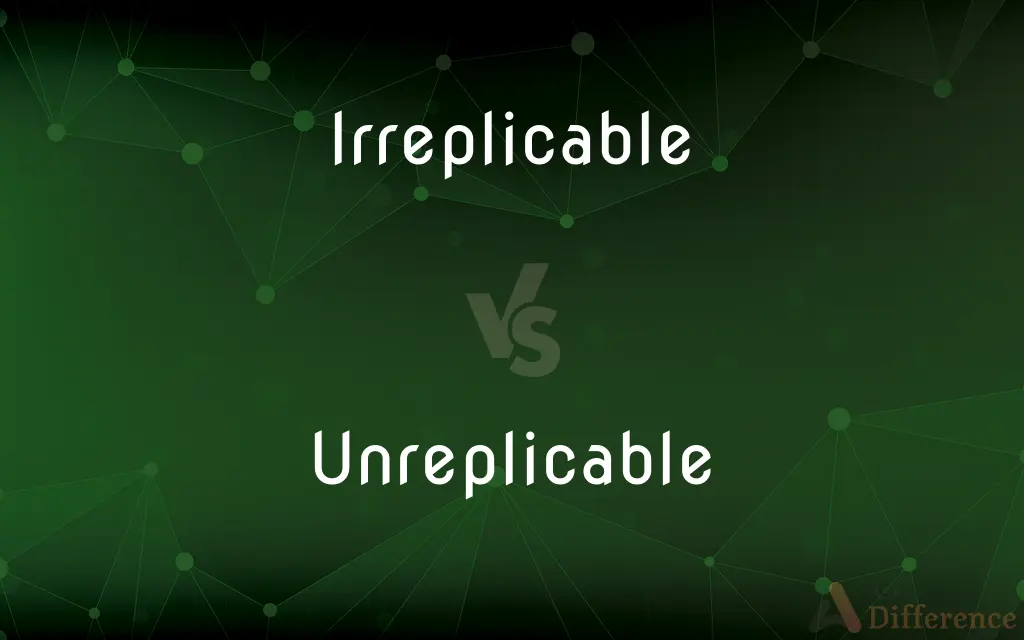Irreplicable vs. Unreplicable — What's the Difference?
By Tayyaba Rehman & Maham Liaqat — Updated on April 2, 2024
Irreplicable implies something cannot be replicated due to unique conditions, while unreplicable suggests a general impossibility of replication.

Difference Between Irreplicable and Unreplicable
Table of Contents
ADVERTISEMENT
Key Differences
Irreplicable often refers to situations, results, or phenomena that cannot be replicated due to specific, unique conditions or complexities. This term emphasizes the uniqueness of the circumstances that led to the original outcome, suggesting that attempting to recreate it under slightly different conditions would not yield the same results. On the other hand, unreplicable is used more broadly to denote anything that cannot be replicated, regardless of the conditions. This could be due to inherent qualities that are impossible to duplicate or scenarios where replication attempts have consistently failed.
The distinction between irreplicable and unreplicable can also be seen in their usage contexts. Irreplicable is commonly used in scientific, research, and artistic contexts, where the specific conditions or unique talents involved make duplication impractical or impossible. Unreplicable, however, is used in a wider range of contexts, including those where the impossibility of replication is more absolute, not necessarily tied to unique conditions but perhaps to fundamental characteristics.
When discussing experiments or artistic creations, irreplicable might be used to describe outcomes that are so tied to the specific time, place, or method of creation that they cannot be precisely duplicated. In contrast, unreplicable could describe something inherently unique, such as a natural wonder or a historical artifact, where the nature of the object itself defies replication.
The nuance between irreplicable and unreplicable also extends to their implications. An irreplicable event carries a connotation of rarity and specificity, suggesting that its unique value is tied to its original context. Unreplicable, however, conveys a sense of absolute uniqueness, indicating that no matter the effort or conditions, the item or event cannot be duplicated.
Irreplicable and unreplicable, while similar, highlight different aspects of the inability to replicate. The former focuses on the unique conditions that prevent replication, whereas the latter suggests a broader, more inherent impossibility of duplication.
ADVERTISEMENT
Comparison Chart
Definition
Cannot be replicated due to specific, unique conditions or complexities.
Cannot be replicated under any conditions, suggesting a more absolute impossibility.
Usage Context
Often in scientific, research, and artistic contexts where unique conditions are crucial.
Broadly used across various contexts where inherent qualities or scenarios prevent replication.
Implication
Emphasizes the uniqueness of the conditions that led to the original outcome.
Suggests an inherent or absolute uniqueness that defies duplication.
Connotation
Carries a nuance of rarity and specificity tied to the original context.
Conveys a sense of absolute uniqueness, beyond the influence of conditions.
Examples
A scientific experiment that cannot be duplicated due to the specific conditions at the time.
A natural wonder or historical artifact that is inherently unique and cannot be replicated.
Compare with Definitions
Irreplicable
Describes scenarios where replication attempts would not yield the same results.
The irreplicable environment of Mars presents challenges for simulation on Earth.
Unreplicable
Applies to unique objects or phenomena that cannot be duplicated.
This unreplicable artifact is the only one of its kind in existence.
Irreplicable
Indicates a rarity in events or phenomena tied to specific circumstances.
The concert's irreplicable atmosphere was due to the perfect combination of artist, venue, and audience.
Unreplicable
Refers to scenarios where no attempts at replication could succeed.
The unreplicable results of the study suggest a need for further investigation.
Irreplicable
Impossible to replicate due to unique, specific conditions.
The irreplicable nature of the experiment's conditions made it a once-in-a-lifetime discovery.
Unreplicable
Denotes an absolute impossibility of replication.
The unreplicable beauty of the natural landscape is awe-inspiring.
Irreplicable
Referring to outcomes or results that cannot be duplicated exactly.
Her irreplicable talent makes her performances uniquely captivating.
Unreplicable
Highlights something's unique, non-duplicable nature.
The unreplicable design of the building makes it a landmark.
Irreplicable
Used in contexts where unique conditions are crucial for the original outcome.
His irreplicable method of painting is difficult for others to mimic accurately.
Unreplicable
Used when describing inherently unique qualities.
Her voice has an unreplicable quality that sets her apart from other singers.
Irreplicable
Incapable of being replicated.
Unreplicable
Not replicable
Common Curiosities
How is unreplicable different from irreplicable?
Unreplicable suggests a broader, more absolute impossibility of replication, not tied to specific conditions but inherent qualities.
Can irreplicable and unreplicable be used interchangeably?
While they are similar, they carry different nuances. Irreplicable is tied to specific conditions, while unreplicable denotes an inherent impossibility.
What makes an experiment irreplicable?
An experiment is irreplicable if its outcomes cannot be duplicated due to the specific, unique conditions under which it was conducted.
What does irreplicable mean?
Irreplicable refers to something that cannot be replicated due to unique conditions or complexities specific to the original context.
Why would something be considered unreplicable?
Something is considered unreplicable if it possesses inherent qualities or characteristics that make duplication impossible under any conditions.
Can technological advancements overcome irreplicability?
In some cases, technological advancements may address aspects of irreplicability by replicating conditions more accurately, but not always.
What implications does unreplicability have for conservation?
Unreplicability emphasizes the importance of preserving unique natural wonders and artifacts, as they cannot be replaced once lost.
Is irreplicability a challenge in art reproduction?
Yes, irreplicability presents challenges in art reproduction, where capturing the unique conditions of the original creation is often impossible.
How can artists create unreplicable works?
Artists can create unreplicable works by incorporating unique elements or techniques that cannot be precisely duplicated.
How do museums deal with unreplicable items?
Museums preserve and protect unreplicable items through conservation efforts and by providing controlled environments to prevent degradation.
Is irreplicability a common issue in scientific research?
Yes, irreplicability can be a concern in scientific research when experiments cannot be duplicated exactly due to specific conditions.
What role does uniqueness play in irreplicability and unreplicability?
Uniqueness is central to both terms; irreplicability emphasizes uniqueness due to specific conditions, while unreplicability suggests an inherent, absolute uniqueness.
Can a person's skills be irreplicable or unreplicable?
A person's skills can be considered irreplicable if they are tied to unique talents or conditions, and unreplicable if they are inherently unique.
Share Your Discovery

Previous Comparison
Etiology vs. Epidemiology
Next Comparison
Strived vs. StroveAuthor Spotlight
Written by
Tayyaba RehmanTayyaba Rehman is a distinguished writer, currently serving as a primary contributor to askdifference.com. As a researcher in semantics and etymology, Tayyaba's passion for the complexity of languages and their distinctions has found a perfect home on the platform. Tayyaba delves into the intricacies of language, distinguishing between commonly confused words and phrases, thereby providing clarity for readers worldwide.
Co-written by
Maham Liaqat












































